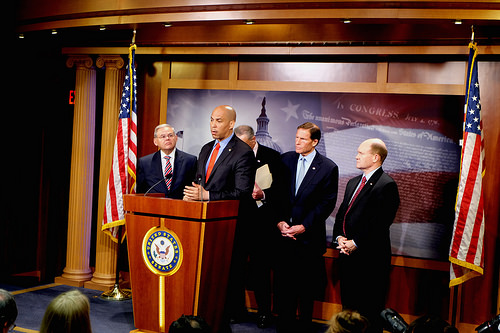Happening Now
Senate Appropriators Reject House’s Cuts to Trains
June 23, 2015

June 23, 2015
The Senate Appropriations Subcommittee on Transportation, Housing and Urban Development, and Related Agencies approved a fiscal year 2016 funding bill that extends current levels of funding for Amtrak at $1.4 billion, rejecting cuts made in the House version of the T-HUD bill. That version of the bill slashed Amtrak funding by $262 million, transit funding by $161 million, and funding for the intermodal TIGER grant program by $400 million.
Fortunately, the Senate measure provided $1.1 billion in capital funding, $289 million in operating funds, and $17 million targeted to the Northeast Corridor. The committee highlighted $50 million in rail safety grants which will help passenger railroads install Positive Train Control (PTC), a life-saving technology federal investigators say could have prevented the deadly May 2015 train crash outside of Philadelphia.
However, while the Senate did well to reject the majority of the House’s cuts, they didn’t go far enough to meet the rapidly growing infrastructure investment backlog facing the country. The subcommittee’s measure slashes $424 million from Federal Transit Administration account, with most cuts coming from the New Starts program, geared toward initiating and expanding heavy- and light-rail urban transit systems. These systems are vital to help deal with surging ridership, and will help America’s cities grow to meet 21st-century economic demand.

This need was once again highlighted June 22 when the bipartisan U.S. Conference of Mayors adopted resolutions calling for greater investment in rail safety and improved funding for transportation at its national meeting in San Francisco.
The fact that the Senate bill provides level funding for highways—presuming Congress will find a yet-to-be-determined financial fix for the perpetually insolvent Highway Trust Fund—and an additional $294 million for the Federal Aviation Administration—bringing the total federal expenditure to $16 billion—proves that appropriators are capable of finding the money when it suits them.
Join NARP in asking the Senate to support the Wicker/Booker passenger rail bill, a forward-looking proposal that looks to expand the national train network, and to strengthen that bill through the introduction of dedicated funding for rail!
Passenger Rail and Transit Funding in the Senate FY 2016 T-HUD Budget
Federal Railroad Administration – $1.68 billion, an increase of $53 million above the FY2015 enacted level. This includes $289 million for Amtrak operations and continued service for all current routes, and $1.1 billion for capital grants. The bill also provides an additional $17 million for the Northeast Corridor.
Rail Safety and Research Programs – $288 million, $12 million above the FY2015 enacted level for rail safety and research programs, including inspectors and training to help ensure the safety of passengers and local communities. The bill also allows $50 million for rail safety grants, to support the implementation of PTC, enhance passenger rail safety, and reduce highway-rail grade crossings incidents.
Federal Transit Administration (FTA) – $10.5 billion, $424 million below the FY2015 enacted level. Transit formula grants total $8.6 billion, which is contingent on the enactment of new transportation authorization legislation, as the current authorization expires this year. This funding level is consistent with the MAP-21 authorization legislation.
The bill provides a total of $1.6 billion for Capital Investment Grants (“New Starts”), fully funding all current “Full Funding Grant Agreement” (FFGA) transit projects as well as new projects. Also $75 million is provided for core capacity projects and $30 million for Small Starts projects--competitive grant funding for major transit capital investments – including rapid rail, light rail, bus rapid transit, and commuter rail – that are planned and operated by local communities.
TIGER Grants – $500 million, equal to the FY2015 enacted level, for TIGER grants (also known as National Infrastructure Investments).
"I wish to extend my appreciation to members of the Rail Passengers Association for their steadfast advocacy to protect not only the Southwest Chief, but all rail transportation which plays such an important role in our economy and local communities. I look forward to continuing this close partnership, both with America’s rail passengers and our bipartisan group of senators, to ensure a bright future for the Southwest Chief route."
Senator Jerry Moran (R-KS)
April 2, 2019, on receiving the Association's Golden Spike Award for his work to protect the Southwest Chief
Comments